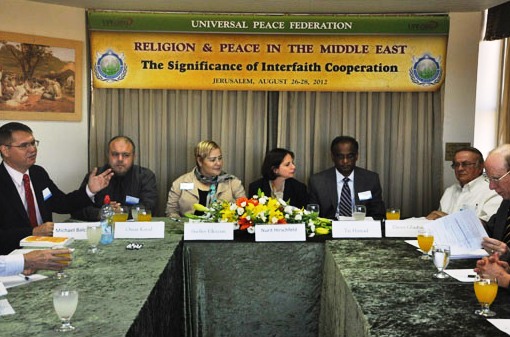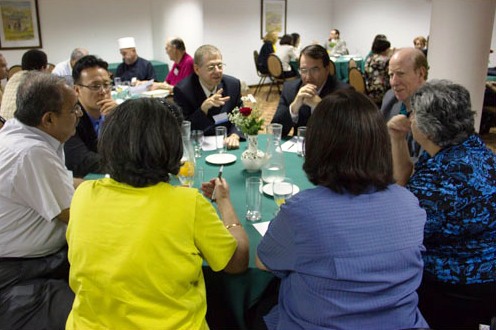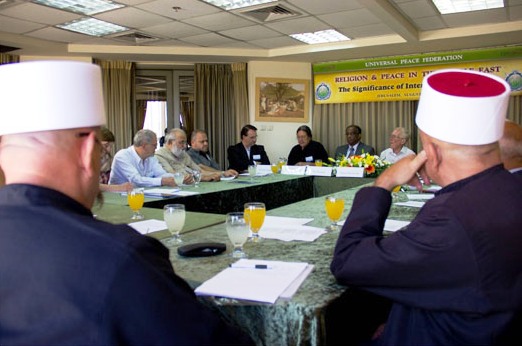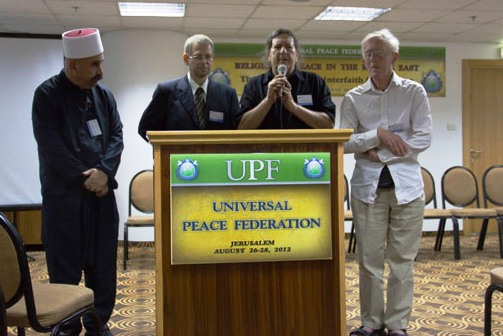![]()
The Words of the Balcomb Family
|
|
The Words of the Balcomb Family |

Jerusalem, Israel -- As civilian casualties mount in Syria, Israel's northern neighbor, and concerns over militant groups operating in the Sinai trouble governments both in Cairo and Jerusalem, UPF's Middle East Peace Initiative (MEPI) took another step forward with a just-concluded interfaith seminar on the topic "Religion and Peace in the Middle East: the Significance of Interfaith Cooperation." The conference was the latest of 37 MEPI programs since the Spring of 2003.
The proceedings, held in Jerusalem on an intimate scale, brought together a total of twenty participants from Israel, the United States and Europe, including Christian, Moslem, Jewish and Druze religious leaders and scholars of religion, diplomats, and political and community leaders.
The first session began with a frank discussion of the limitations of any religious or inter-religious intervention in the region. Dr. Thomas Walsh, UPF President, spoke about the field of "Track Two" diplomacy in general, noting the need for a balance between "soft" approaches involving ideas and beliefs and the "hard" political, military and economic forces that shape and transform the uneasy relations between all nations in the region.

Imam Dr. Abdujalil Sajid, a Muslim leader from the United Kingdom, suggested that more could be done to explore the common ground between the major faiths in the region. "I must admit that Muslims have failed to publicise the pluralistic vision of Islam," Saijid said, noting that as a result Islam has often been portrayed in the European popular media as a force of instability and even terrorism. Dr. Marco Frenschkowski, the well-known scholar of religion from Leipzig University in Germany, cautioned that although scholars could and should do their best to enhance knowledge and understanding among religious traditions, there are always powerful emotional and social forces involved in religion that defy simple rational analysis.
A second session reviewed Israel's relations with its neighbors in the Muslim world. The Hon Ran Cohen, former long-term member of the Israeli Knesset, saw some hope in the emergence of the "Arab Spring" despite the many conflicts.
Despite the possible increase in extremist perspectives, he said, the people of many Islamic states were beginning to question their own leaders and traditions, rather than (as in the past) taking the easy route of blaming Israel for all their difficulties. However, Israelis themselves should question their own deeper commitment to peace, because despite overwhelming support in opinion polls for peace with the Palestinians, the public continues to return governments that are opposed to the most likely solutions.

Dr. Eldad Pardo, a noted scholar of Iranian political culture, pointed out that Israel and Iran need not be enemies, despite the current rhetoric of annihilation. In fact, for a long period of time, up until the early 1990s, Iran had actually been an ally of Israel and had looked with interest and appreciation on the successful Israeli integration of the interests of faith and democracy, particularly with regard to the handling of religious political parties. Today the Iranian experiment with religious oversight of political life is under great stress and already several potential internal uprisings have been tried. Israel need not and should not attempt to intervene, Pardo said.
Ambassador Sam Zakhem, for years the US Ambassador to Bahrain, called for a renewed role for the United Nations in the region. After reviewing the major political developments from the time of the British Mandate to the present day, Zakhem noted that disagreement between the former cold-war Security Council superpowers Russia and the USA had led to excessive use of the veto, preventing potential progress in the region. He called on non-governmental actors to continue working to find common ground that would allow regional powers to exert a calming influence.

Another session examined the particular contribution that could be made by religious leaders. Dr. Marcus Braybrooke, President of the World Congress of Faiths, cited the work of the South African reconciliation committees reported by Archbishop Desmond Tutu in his book No Future Without Forgiveness and called for religious leaders to take more initiative in exorcizing ancient and recent resentments and injuries. Mr. Joseph Montville, who teaches at George Mason University in the USA and formerly worked extensively for the US State Department in the region, drew attention to the unfortunate and disproportionate impact on policy of religious extremists from all parties, offering the example of the influence of the radical religious movement and the rising numbers of ultra-Orthodox Jews in Israeli society.
Dr. Michael Balcomb, UPF Communications Director, examined the inherent instabilities of pluralism while noting that many see that a multifaith pluralistic future is the only viable alternative to increased polarization. "In the United States, pluralism has also led to individualism and relativism," he said, "and the resulting moral decay in the US national culture -- at least as portrayed in the media -- may well be acting as a catalyst to further incite a rejection of western values by more and more sectors of Islamic society."
The UPF group was then joined by an equivalent number of local UPF Ambassadors for Peace and other community figures, including a number of college professors, imams, leaders of the Druze community, and families from both East and West Jerusalem for a roundtable discussion followed by dinner.
A final session the following morning examined recent "best practices" and initiatives being undertaken in Israel and worldwide. Several spoke of the paramount importance of personal example, including Jabur Manzur, a Druze leader from Usdia who with his wife counsels young married couples in the town of Jdeyde, and was recommended to the conference along with a Muslim colleague by the Israeli Ministry of Religions, spoke of the principles of peace and harmony in the Druze religion as being a good foundation for interfaith activity.
Imam Omar Kayal from Jedye, also recommended by the Ministry, said he made it a point to regularly visit with and support the local Christian priest in his village, and to make sure that Christian families, even though very much in the minority, were properly respected and supported during times of difficulty.
Two Jewish women, scholars Dr. Shelley Elkayyam and Dr. Nurit Hirschfeld, spoke about the impact of the MEPI program in Israel, including the major interfaith pilgrimages in 2003 and 2004 during the peak of the second Intifadah. "Whether there is a relationship of cause and effect or not, the fact is that violence declined after these efforts, and it is worth continuing to invest in them," said Elkayyam. Dr. Hirschfeld spoke of plans to establish a new interfaith council or think tank in Jerusalem, based on the foundation of the seminar.